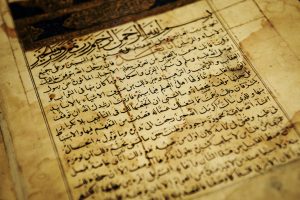Hazrat Mirza Ghulam Ahmad (as), the Promised Messiah and Imam Mahdi

The Promised Messiah (as) wrote over 80 books in Arabic, Urdu, and Persian. Excerpts of his collected works have been translated into English and organised by topic. The Review of Religions is pleased to present these excerpts as part of a monthly feature. Here, the Promised Messiah (as) explains why the expression ‘Father’ is not appropriate to describe God and how Arabic is more expressive than all other languages.
Extracts from The Essence of Islam, Vol. II, 25-29. This is the third part of a three-part series.
We have to record with great sorrow that an ignorant European Christian writer has set out in one of his books that Christianity possesses this superiority over Islam, that it has named God Almighty ‘Father’, which is a very dear and lovely name, and that this name has not been applied to God in the Qur’an. We are surprised that this critic has not considered what honour and greatness the lexicons have attributed to the expression ‘Father’, for every word acquires true honour and greatness from the position assigned to it by a lexicon, and no one is entitled to bestow such honour upon a word as the lexicon does not bestow. That is why even the Word of God does not disregard the lexicon, and according to all sensible people, in order to determine the honour and greatness of a word, recourse must first be had to the lexicon, in order to ascertain what robe of honour it has bestowed upon that word. Keeping this criterion in mind, we find that all that the lexicon discloses is that when a person is in fact born of the seed of another, and he who drops the seed has no further connection with his birth, it is said that that other is his ab (father). If it should be desired to indicate that Almighty God is Himself the Conscious Creator of a person, and Himself leads him towards perfection, and out of His great mercy bestows appropriate bounties on him, and is Himself his Guardian and Supporter, the lexicon does not permit that these connotations may be expressed by the employment of the word ‘Father’; the lexicon provides another term for the expression of this concept, and that word is Rabb, the true meaning of which we have just set out on the authority of the lexicon. We are not at all entitled to invent our own lexicon and must follow the division of words established by God from the beginning.
The Word ‘Father’ is Derogatory to God
This would show that the application of the word Father to God is disrespectful and derogatory to Him. Those who have invented against Jesus (as) the charge that he was in the habit of calling God Almighty ‘Father’, and in fact believed that God was his father, have been guilty of accusing him of a false and hateful offence. Can any sensible person imagine that Jesus (as) was guilty of such stupidity as to have applied to God, the Glorious, a name, the etymological meaning of which should be so low and humiliating and indicative of weakness, powerlessness and helplessness from every point of view?…
The word ab (father) is so low and humiliating that it does not necessarily import any kind of design or nurture or love. For instance, a goat that covers a she-goat and drops its seed or a bull that satisfies its lust with a cow and then turns away from it without any thought of a calf being born of its action, or a pig which under the surge of its lust is constantly occupied in satisfying it and has no notion that through its repeated action whole litters of piglets might be born and spread in the earth, would no doubt, if its lustful activities produce its young, be called their father. According to all the lexicons the word ab does not in the least imply that a father, after dropping the seed, should take any further action so that a child may be born, or that this should be his design at the time of cohabitation; indeed the word ab does not necessarily imply desire for progeny, and all that it imports is that he should drop the seed, and it is only on that account that lexicographically he is called ab. Then how can it be permissible that such a worthless word, which is so appraised in all languages, should be applied to the All-Powerful One, all of Whose works are manifested by virtue of His perfect designs, perfect knowledge and perfect power? How can it be right that the same word, which is used for a bull and for a pig, should be used for God Almighty also? What impertinence is this, which the ignorant Christians persist in committing? They have been left with neither shame nor modesty nor any understanding of human values. The doctrine of the atonement has affected their human faculties like paralysis, so that they have been rendered utterly worthless and without feeling…
Here we consider it proper to dispel some of the doubts and misconceptions of Max Müller which he discusses in the first volume of his book on the science of languages. His statement: One factor that has blocked the progress of knowledge is that some people, in order to expose other people to ridicule and contempt, employed contemptuous epithets to them, and thus failed to learn their languages. So long as the words wild and dumb (‘ajami) as applied to those people were not excluded from human dictionaries, and did not give place to the expression ‘brother’, and so long as it was not acknowledged that all mankind are of one species, a beginning could not be made with the science of languages.
My statement: The above statement shows that the writer is critical of the Arabs and imagines that the expression ‘ajam, applied by them to those whose language is other than Arabic, is used out of bigotry and contempt for those people. He fell into this error because his Christian bigotry stood in the way of his finding out whether the expressions ‘ajam and ‘arab were devised by man or by God Almighty. He has himself acknowledged in his book that man has not the capacity to formulate the elementary words of a language on his own. Arabic has two words in juxtaposition to each other. One is ‘arab, which connotes those who are eloquent and possess mastery of expression; and the other is ‘ajam, which means non-eloquent and tongue-tied. If Mr Max Müller thinks that these two words are not ancient and Islam has invented them out of bigotry, he should specify the original terms which were used in these connotations, for it is not possible that a people should not have had any appellation in ancient times. If it is found that these two expressions are ancient, this would mean that they were not coined by man, but that the Almighty, Knower of the unseen, Who has created man with diverse capacities, has Himself applied these two names to different peoples corresponding to their respective abilities.
Another consideration is that if these two expressions, ‘arab and ‘ajam, have been coined by some human being out of bigotry and contempt, then doubtless they would be contrary to fact and would be altogether false. But we have established in this book that the word ‘arab expresses a reality, and that it is true in fact that the Arabic language, on account of its system of elementary words and its delicate structure and other wonders, occupies so high a position that one is compelled to affirm that in comparison with it other languages are like the dumb. Moreover, we observe that other languages are motionless like solids and are so bereft of any movement towards development as if they are lifeless, and we are compelled to acknowledge that they occupy a very low position. The Arabic language describes non-Arabs politely as ‘ajam but in truth they did not deserve even this appellation. Had the low condition of their languages been correctly described the most appropriate expression to be applied to them would have been that they were dead languages.
—Minan-ur-Rahman, Ruhani Khaza’in, vol. 9, pp. 145-161
Glory be to Arabic, how beautiful is its countenance, looking out of perfectly illumined mantles! The earth has been brightened with its exalted lights, and it has been proved to possess the climax of the yearnings of man. In it are found wonders of the All-Wise and Powerful Maker, as they are found in everything which proceeds from the Great Creator. Allah has perfected all its limbs and has not left out anything from its beauty and splendour, and no doubt you will find it perfect in expression, comprising all the objectives of man. There is no action that begins at any period of time, nor is there any attribute out of the attributes of Allah, the Bestower, nor is there any doctrine out of the doctrines of mankind, but there is in Arabic an elementary word apposite to it. Should you have a doubt about it, let us know the contrary.
—Minan-ur-Rahman, Ruhani Khaza’in, vol. 9, pp. 193-194



Add Comment